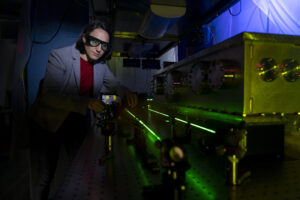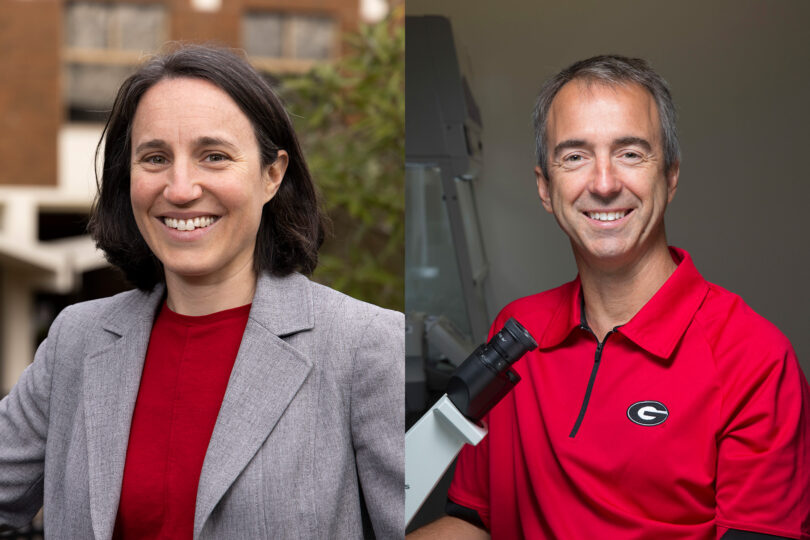Faculty members Melanie Reber and Eric Harvill have been named Innovation Fellows for spring 2021. Launched as part of the University of Georgia’s campus-wide Innovation District initiative, the semesterlong fellowship helps faculty align their research activities with industry needs and bring their discoveries to the marketplace.
Reber, an assistant professor of chemistry in the Franklin College of Arts and Sciences, is developing a cavity-enhanced, two-dimensional spectroscopy that uniquely combines precision management and ultrafast lasers for molecular-level examinations. Reber previously participated in UGA I-Corps, exploring potential applications and markets for her technology including quantum computing.

Melanie Reber adjusts one of the lasers she uses for her research in her lab at the Chemistry Building. (Photo by Andrew Davis Tucker/UGA)
“In my lab, I work on building massive laser-based instruments to study the fundamental quantum mechanics of molecules and we often develop new types of lasers or laser technology to do so,” Reber said. “With this fellowship, I am excited to pursue corporate partnerships and other ways to bring these technologies closer to commercialization.”
Harvill, the Athletic Association Distinguished Professor of Infectious Disease in the College of Veterinary Medicine, examines respiratory diseases and the interactions between microbiota and host immunity. He recently generated a novel strain that it is more effective than existing vaccines in generating immunity against Bordetella species that cause whooping cough in humans and related respiratory diseases in other animals. Harvill aims to better communicate and collaborate with industry partners to move his technology out of the lab.
“I’m really excited to be part of this program,” Harvill said. “The short- and long-term applications of what we have found have been clear to me for a while, but I have no training or knowledge of how to communicate them to partners who could commercialize them. I’m very optimistic that this program can help me find the partners to move these forward.”
Ian Biggs, director of programming for the Innovation District and director of Innovation Gateway’s startup program, will spend the next several months guiding Reber and Harvill through the process. Each fellow will commit eight hours per week to the program, which incorporates mentorship, training, funding and other resources within the university’s innovation and entrepreneurial ecosystem.
“We will help Melanie and Eric explore the various facets of their chosen industry and then tailor the program and curriculum to their specific needs,” Biggs said. “This approach will allow them to see a pathway toward commercialization, where their research endeavors are most valuable.”








